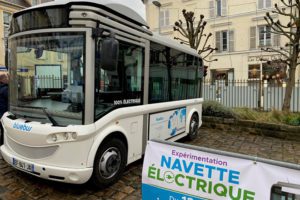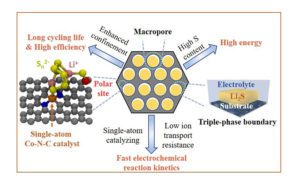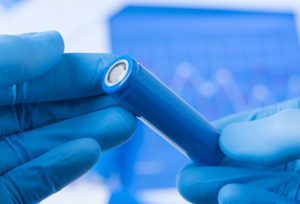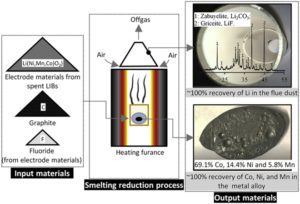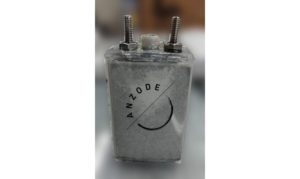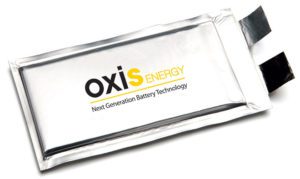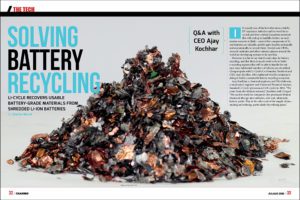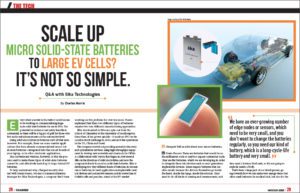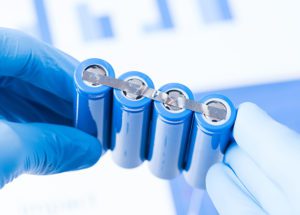The French city of Triel-sur-Seine has launched a trial of an electric shuttle service that uses a six-meter electric bus made by Bluebus, a subsidiary of the Bolloré Group. The minibuses, which will be delivered this summer, are part of an order for up to 800 e-buses from three manufacturers by Île-de-France Mobilités, an agency… Read more »
Search Results Found For: "lithium metal batteries"
Hong Kong researchers propose novel cathode design for Li-S batteries
A team led by Professor Zhao Tianshou of the Hong Kong University of Science and Technology has proposed a novel cathode design concept for lithium-sulfur (Li-S) batteries. Li-S batteries are regarded as attractive alternatives to Li-ion batteries. They are known for their high energy density, while their major component, sulfur, is abundant, light, cheap and… Read more »
Momentum Technologies licenses ORNL process to recover metals from batteries
Momentum Technologies, a Dallas-based materials science company focused on extracting critical metals from electronic waste, has licensed a process developed by the Oak Ridge National Laboratory (ORNL) for recovering cobalt and other metals from spent Li-ion batteries. Several critical elements, such as cobalt, nickel, lithium and manganese, are used in EV batteries. Using ORNL’s Membrane… Read more »
New smelting reduction process recovers Co, Ni, Mn, and Li from Li-ion batteries
A team from metals research institute SWERIM in Sweden has reported on a smelting reduction process to recover cobalt, nickel, manganese and lithium simultaneously from spent Li-ion batteries. A paper on their work was published in the Journal of Power Sources. Results from the laboratory-scale smelting reduction (carried out at 1,550°C in an Ar atmosphere… Read more »
Anzode gets $1.7-million CEC grant for non-lithium batteries
Battery startup Anzode has received a $1.7-million award for a three-year effort to develop a new generation of non-lithium batteries, as part of the California Energy Commission (CEC) Grant Funding Opportunity “Developing non-Lithium Ion Energy Storage Technologies to Support California’s Clean Energy Goals.” The CEC has awarded almost $11 million for developers of energy storage… Read more »
Oxis Energy’s ultralight Li-sulfur batteries are aimed at aviation
Oxfordshire-based Oxis Energy has been working on lithium-sulfur battery technology since 2004 (Charged has reported on the company several times over the years). In a recent article in IEEE Spectrum, the company’s Head of Battery Development and Integration, Mark Crittenden, explains why lithium-sulfur tech is uniquely suited to electric aviation. Weight is a critical constraint… Read more »
Li-Cycle recovers usable battery-grade materials from shredded Li-ion batteries
Q&A with CEO Ajay Kochhar It’s usually one of the first objections cited by EV naysayers: batteries can’t or won’t be recycled, and they contain hazardous materials that will end up in landfills. In fact, no such sinister scenario is likely—most of the components of Li-ion batteries are valuable, and it’s quite feasible, technically and economically,… Read more »
Ampcera announces new solid electrolyte technology for solid-state batteries
Ampcera has introduced a low-cost flexible solid electrolyte (SE) membrane technology for solid-state batteries (SSBs). Ampcera’s SE membranes can be as thin as 25 microns, offer room temperature lithium ionic conductivity greater than 1 mS/cm, and are stable against a lithium metal anode. According to the company, they would enable solid-state lithium metal batteries with… Read more »
Scale up micro-solid-state batteries to large EV cells? It’s not so simple.
Q&A with Ilika Technologies Every other scientist in the battery world seems to be working on commercializing large-scale solid-state batteries for use in EVs. The potential for technical and safety benefits is substantial, so there will be a big pot of gold for those who first make real advancements on the automotive level. Using solid… Read more »
Silica-based cathodes could enable long-life lithium-sulfur batteries
Scientists from the Daegu Gyeongbuk Institute of Science and Technology (DGIST) have developed a silica-based cathode for lithium-sulfur batteries, which they say could enable batteries that last for over 2,000 charge/discharge cycles. Lithium-sulfur batteries (LSBs)—composed of a sulfur-based cathode and lithium anode submerged in a liquid electrolyte—are promising candidates to replace lithium-ion batteries because of… Read more »




